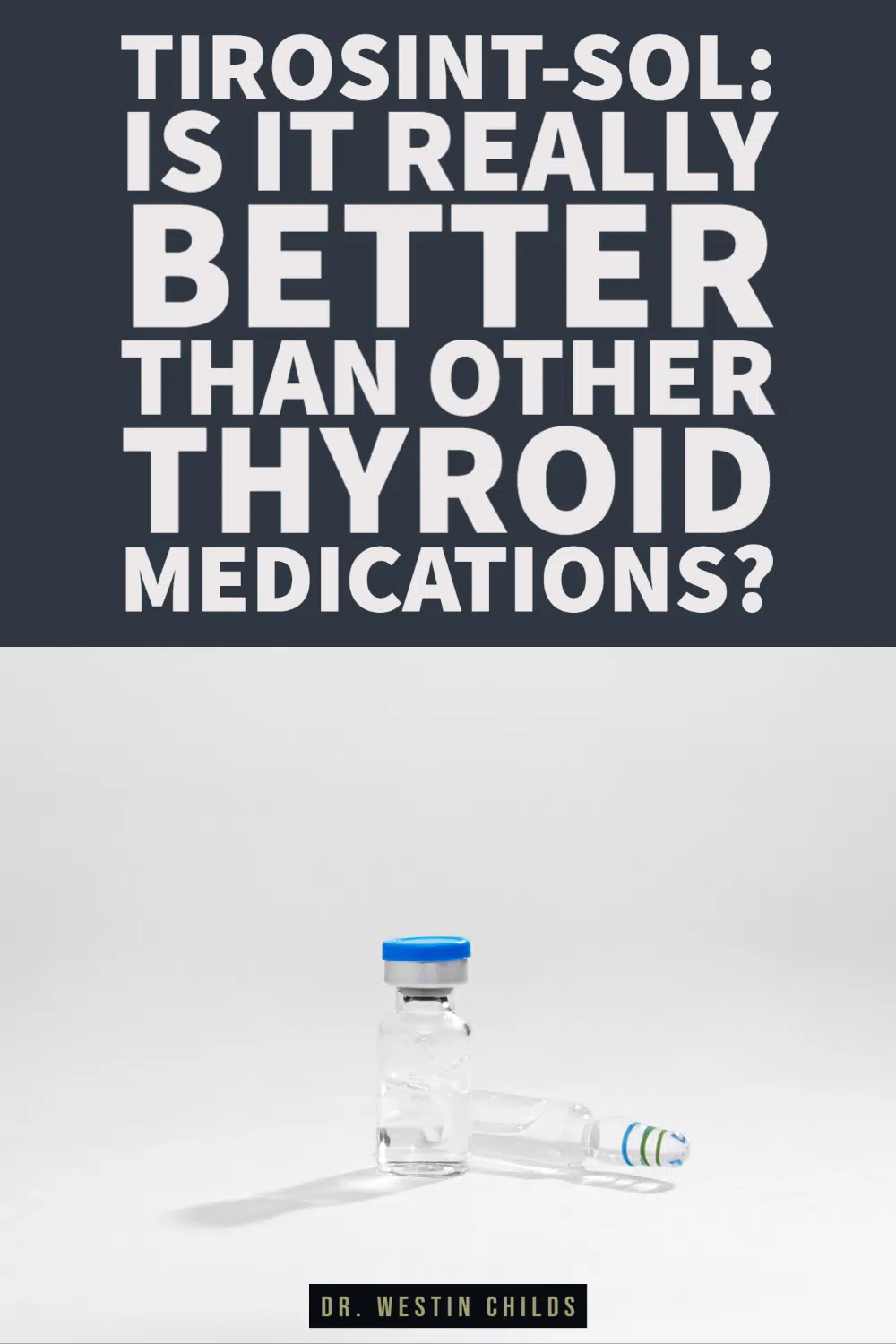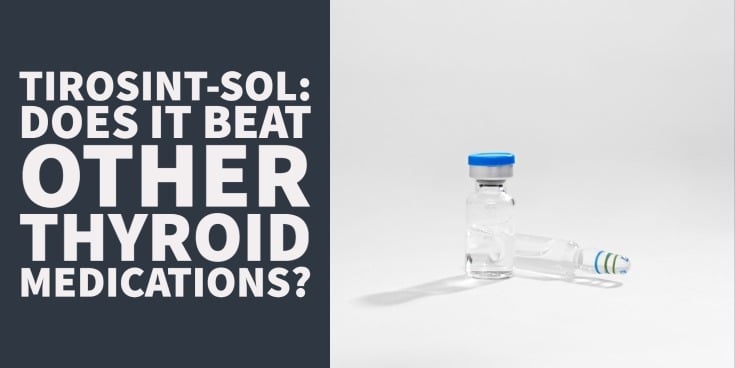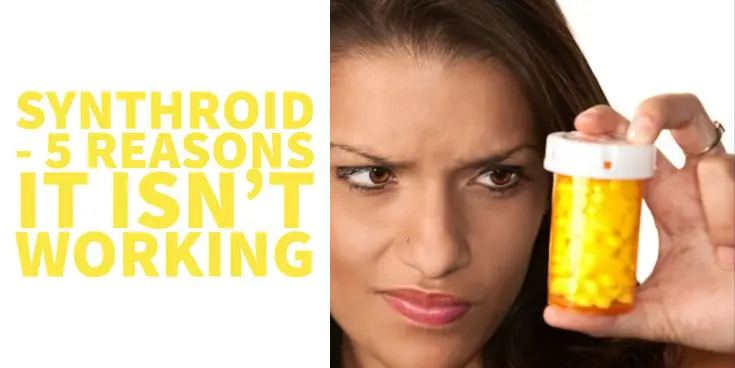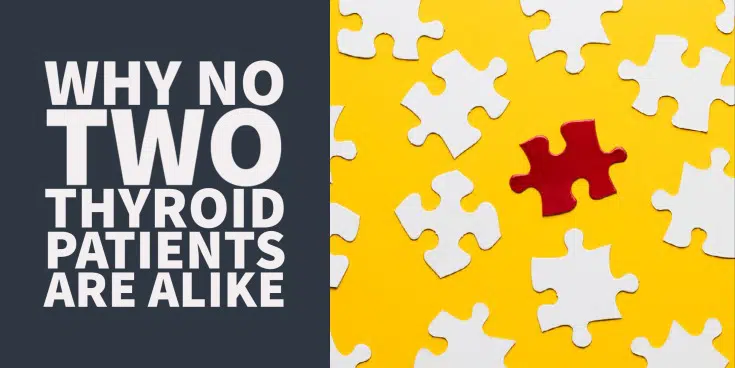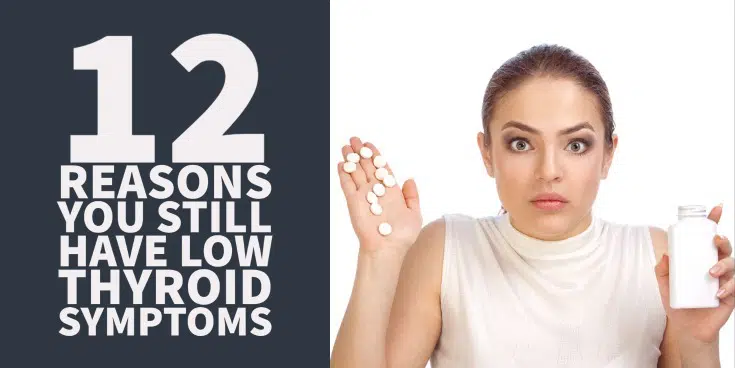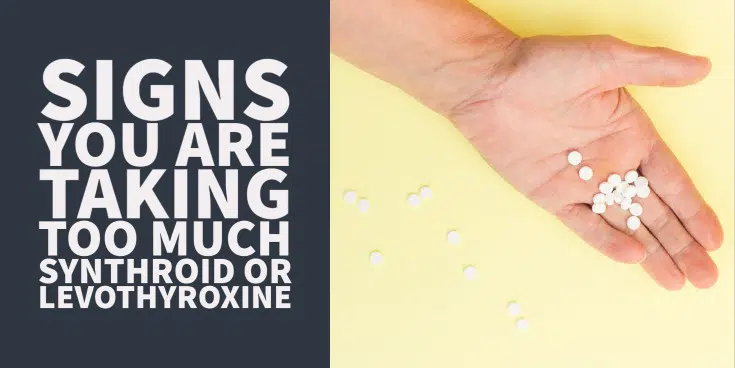Tirosint-Sol is a newer thyroid medication that was recently released in the United States to treat hypothyroidism.
And it is now the ‘cleanest’ thyroid medication on the market today!
There are a great many benefits to this medication (1) that I want to explore with you in this article.
I fear that the benefits of this new medication may be understated by doctors who don’t understand that so many people have problems with thyroid medication absorption.
So let this article be a guide to help you understand the issues with other thyroid medications and why Tirosint-Sol can be a great asset to many thyroid patients.
Disclaimer: While I am writing about the benefits of Tirosint-Sol I have NO affiliation with the pharmaceutical company that produces or manufactures this medication. All of the opinions you see here are mine. All financial interests between doctors and pharmaceutical companies are made public and you can confirm that I have no affiliation with them in any way through public forms. I actually believe that this medication can provide a great benefit to many thyroid patients which is why I am sharing this information.
What is Tirosint-Sol?
Put simply:
Tirosint-Sol is a new thyroid medication (2) that is designed to treat hypothyroidism and is also FDA-approved to treat people with thyroid cancer who need a suppressed TSH.
New thyroid medications can be confusing to people who are already taking thyroid medication.
They see a ‘new medication’ and may think that we have made new advancements in thyroid medication technology.
While that is partially true, it’s probably not exactly what you think.
Tirosint-Sol is really just an elaboration on a medication that already existed known as Tirosint.
Tirosint should be differentiated from Tirosint-Sol, however, because they are different (more on that below)!
So, while the medication is new, the relative treatment has stayed the same.
Tirosint-Sol is unique among thyroid medications not because it contains a new thyroid hormone but because of how it comes prepared and how you take it.
You are probably used to taking medications that are either formulated in capsules or formulated in tablets.
These tablets are necessary to help stabilize the medication, but they can also cause trouble for a number of patients (again, an elaboration on that very topic below!).
Tirosint-Sol bypasses this problem because it comes in a liquid form.
Yes, that’s right, Tirosint-Sol is a liquid thyroid medication that can be swallowed or placed in a cup of water.
The reason this is so important has to do with how many thyroid patients suffer from thyroid hormone malabsorption from things like medications they take (3), supplements they are using, low stomach acid (4), binders/fillers in existing thyroid medications, existing intestinal issues (5), and so on.
Let’s explore these topics in more detail to see if Tirosint-Sol is right for you.
Inactive Ingredients and How they Impact your Thyroid
You’re probably used to thinking about medication side effects before you take a medication.
Thyroid medication is no exception, and you should absolutely be thinking about these effects before you start taking any medicine.
But you need to understand what causes these side effects.
You can get side effects from the active ingredients in the medication (this is the part of the medication that impacts your physiology) but you can also get them from the inactive ingredients in the medication (6) (these ingredients do not serve a physiologic purpose but they are there to stabilize your medicine and manipulate how it is absorbed).
When it comes to thyroid medication, you really need to understand how these two things impact how you feel while taking a medication.
Because the active ingredient in any thyroid medication (including Tirosint-Sol) is the exact same replica of the thyroid hormone that your body makes on its own, any reaction you get related to this part of the medication is DOSE-RELATED (7).
The reason is simple:
Unless you were born without a thyroid, your body knows how to handle thyroid hormones. It knows how to eliminate it, it knows how to use it on your cells, etc.
But what it doesn’t necessarily know how to use are the inactive ingredients.
And these ingredients can cause issues that are unrelated to the active ingredient (the actual thyroid hormone).
You are, therefore, much more likely to respond to these ingredients when you take thyroid medicine.
And the way that you react to these ingredients can include a number of negative side effects and symptoms.
Reactions to inactive ingredients may include:
- Urticaria (hives)
- Pruritis (itching of the skin)
- Skin rash
- Flushing
- Angioedema (rapid swelling)
- Abdominal pain, nausea, vomiting, diarrhea
- Fever
- Arthralgia (joint pain)
- Wheezing
These are all potential symptoms that can occur if you do not react well to the inactive ingredients in medications!
Collectively they are known as hypersensitivity reactions.
The good news is that these symptoms stem only from the inactive ingredients which means if you have them they should go away once you stop taking the medication.
It also means that you can typically get rid of them by switching to a medication (such as Tirosint-Sol) that does not contain them.
These symptoms are severely underdiagnosed and it is my belief that these hypersensitivity reactions tend to occur more commonly in people with hypothyroidism and especially those with Hashimoto’s thyroiditis.
These patients (including you if you fall into this category) tend to be more sensitive to all types of medications and ingredients!
And, as an aside, this is also why I typically recommend who have hypothyroidism eliminate all unnecessary exposure to chemicals and pesticides just to be on the safe side.
One last point while we are on this topic:
There are no patients who are known to be sensitive to thyroxine which is the active ingredient in Tirosint-Sol and all other thyroid medications (except Cytomel/liothyronine), so if you are having a negative reaction it is either dose-related (meaning you are taking too much or too little) or you are reacting to the inactive ingredients/binders/fillers in the medication itself.
Tirosint-Sol Ingredient List
As I mentioned previously, Tirosint-Sol is now the ‘cleanest’ thyroid medication on the market because it has the fewest inactive ingredients.
You generally want a medication with fewer inactive ingredients because it means that you are much less likely to react negatively to those inactive ingredients.
Active ingredient in Tirosint-Sol:
- Thyroxine (This is the T4 thyroid hormone that your body produces naturally)
Inactive ingredients in Tirosint-Sol (8):
- Water
- Glycerin
This gives Tirosint-Sol a grand total of 3 ingredients (1 active and 2 inactive).
The next closest medication is Tirosint which contains 4 total ingredients.
This might not seem like a big deal until you realize how your body can react to all of the inactive ingredients that I mentioned above.
And until you realize just how many inactive ingredients other medications have.
Let’s compare this to Synthroid to help give you a better picture:
Active ingredients in Synthroid:
- Thyroxine (This is the T4 thyroid hormone that your body produces naturally)
Inactive ingredients in Synthroid (9):

- Acacia
- Confectioner’s sugar (contains corn starch)
- Lactose monohydrate – Yes this is lactose which may cause reactions in those who have lactose intolerance!
- Magnesium stearate
- Povidone
- Talc
- Color additives vary by strength and may include any of the following: FD&C Yellow No. 6 Aluminum Lake, Red No. 40, Blue No. 2, Yellow No. 10, Red No. 27 and 30, Blue No. 1,
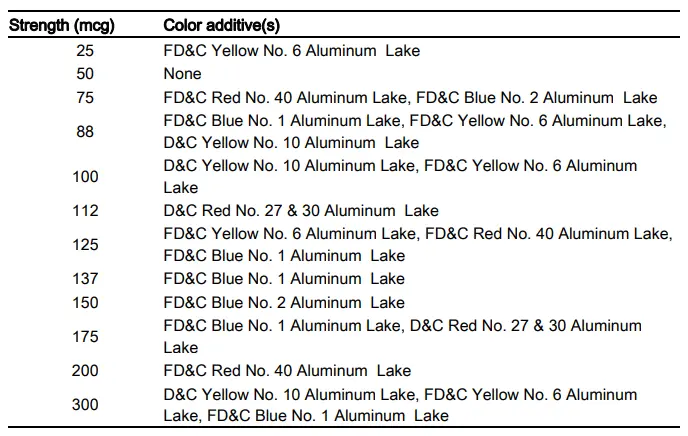
Dosages & Strengths
Tirosint-Sol is unique among thyroid medications because it is not contained in a tablet or capsule.
This means it does require some basic measurements to get your dose.
When you pick up the prescription it is given to you in an ampule that contains a liquid of thyroid hormone suspension.
Each liquid suspension contains a certain concentration per milliliter of fluid.
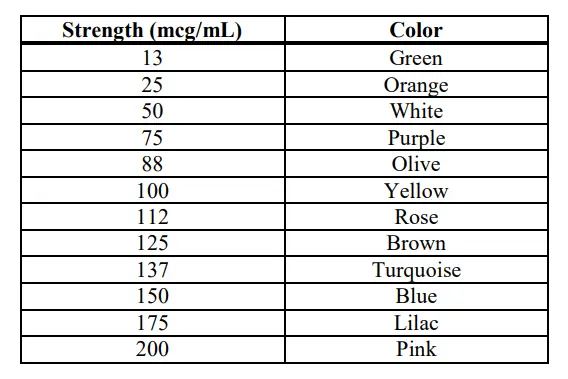
You then obtain your target dose by either directly putting the ampule into your mouth or by diluting it in water.
Each packet comes with 30 ampules that can be taken daily.
You can see an image of what that looks like below:
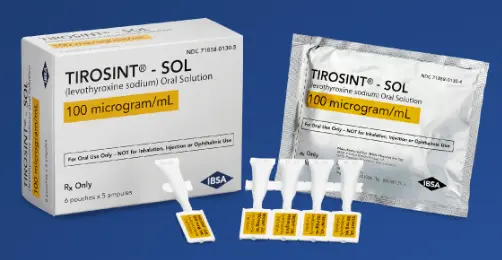
Let’s use a real-world example to make it more clear:
Imagine you are taking 100mcg of Synthroid and you want to switch to Tirosint-Sol because you are experiencing hypersensitivity side effects.
In this case, you would get a new prescription for 100mcg of Tirosint-Sol which would come in a yellow suspension.
Each day you would swallow or put into your mouth 1 milliliter of this fluid.
Each milliliter of fluid you consume equals the same 100mcg of thyroxine you were getting from your Synthroid.
You are probably not used to using liquid medications as an adult, but they may be hugely beneficial to those who have the issues we are about to discuss!
Who should use Tirosint-Sol?
So, should you run out and switch your prescription to Tirosint-Sol after reading this article?
Not necessarily, but you should definitely consider it if you fit into any of the classifications below.
These people tend to have issues with regular thyroid medication due to a myriad of issues that can limit how much thyroid medication they are absorbing from capsules or tablets.
A list of people who should consider switching from their current thyroid medication to Tirosint-Sol include:
- Those people with intestinal issues (this includes conditions such as Celiac disease, IBS, IBD, acid reflux, low stomach acid, etc.) – all of these conditions make absorbing your thyroid medication more difficult.
- People who have hypersensitivity symptoms when taking Synthroid or levothyroxine.
- People who are lactose intolerant (10).
- Those people who have trouble balancing their TSH and free T4/free T3 despite taking their medication faithfully each day.
- People who continue to have the symptoms of hypothyroidism (weight gain, fatigue, hair loss, etc.) despite taking their thyroid medication each day and having “normal” labs.
- People who have a schedule that doesn’t allow for their thyroid medication to be taken on an empty stomach.
- People who take multiple other types of prescription medications (these medications can all potentially interfere with thyroid medication absorption)
- People taking iron, calcium supplements (11), or chromium picolinate (12) (these supplements can bind to and inhibit the absorption of thyroid medication in your intestinal tract).
- People who find it difficult to take their thyroid medication on an empty stomach (due to side effects or schedule).
- People who are taking antacids, sucralfate, or proton pump inhibitors (13) (these all lower stomach acid and may decrease how well your body can break down the inactive ingredients in medications like Synthroid and levothyroxine).
Remember:
Not every single person will react the same way to thyroid medication.
So even if you fall into the categories listed above doesn’t mean you HAVE to switch medications.
But it does mean you should seriously consider it, especially if you are feeling poorly and you (or your doctor) don’t have a good explanation for it.
Tirosint vs Tirosint-Sol
We won’t spend too much time on this topic but I want to quickly discuss the difference between Tirosint and Tirosint-Sol because I foresee this being an issue.
Tirosint is a thyroid medication that has been available for some time and contains very few inactive fillers and ingredients.
It is different from Tirosint-Sol, however, because it comes in a GEL CAPSULE.
It is also different because it has a few more inactive ingredients compared to Tirosint-Sol.
Tirosint-Sol, on the other hand, is a complete liquid that comes in ampules and which only contains water, glycerin, and thyroxine making it the cleanest thyroid medication available.
Tirosint should also be differentiated from Tirosint-Sol because it is quite expensive.

A month’s supply of Tirosint in a gel capsule will run you over $100 per month if you pay the cash price.
Tirosint does have coupons available which you can take advantage of, however, to help reduce this price.
In addition, there is now a generic Tirosint available from two pharmaceutical companies.
These generic versions are brand new as of late 2020 and early 2021 but they can be added to the family of Tirosint medications.
You now have the option of using Tirosint (brand name), Tirosint (generic), and Tirosint-Sol.
In the past, I would typically start people directly on Tirosint because of these inactive ingredients (and skip levothyroxine/Synthroid), but that recommendation may switch to Tirosint-Sol in the future.
How Much Does it Cost and Where can I get it?
At the time that I wrote this article, it was actually somewhat difficult to get Tirosint-Sol.
Now that’s not the case.
While it’s still expensive compared to other thyroid medications, it’s now available at many other locations.
You can find Tirosint-Sol at pretty much every major box pharmacy out there including places like Walgreens, CVS, Costco, Target, and Walmart.
The cash price for 30 ampules of 100mcg of Tirosint-Sol will run anywhere between $115 to $200 based on my own location and zip code:
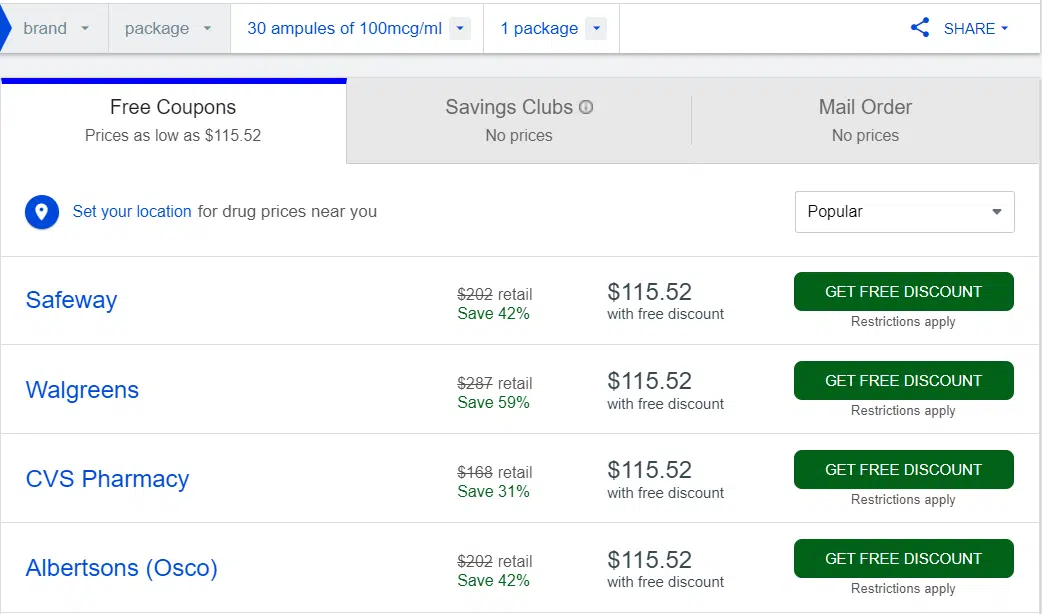
This is obviously much more expensive than the generic $4 monthly price of something like levothyroxine but the price may be worth it if it means feeling better and having your life back.
There are also other ways to help reduce the cost including some coupons from the manufacturer.
There are some savings that you can find directly from the manufacturer here.
These savings don’t work for everyone and do have some limits but you may be able to get them to work with your doctor.
Another trick you can try is to ask your prescribing doctor for some samples.
Doctors are often given samples of medications to give to patients so they can try them out.
Sometimes these samples can be quite large!
If you can get your doctor to give you some samples then you may be able to try the medication out to see if it works for you before dropping the money.
If you can get Tirosint-Sol at a price that is even remotely similar to that of levothyroxine then it’s a no-brainer.
The increased absorption and flexibility in dosing will make jumping through some hoops well worth the process.
Conclusion
If Tirosint-Sol continues to remain cost-effective (and cheap) then I honestly believe it may be worth it for MANY thyroid patients (probably the majority) to switch to it.
The reason is simple:
In order for thyroid hormone to work, it must get into your body and bloodstream. And I think the number of people who suffer from thyroid hormone malabsorption (for a variety of reasons) is grossly underestimated.
If you can afford Tirosint-Sol and you have a provider who is willing to give it a try, then I would at least consider a trial of this new medication.
If the price of this medication shoots up to an unreasonable amount over the coming months then I may retract my statement, but I believe a great many people can benefit from using it right now.
Now I want to hear from you:
Are you taking thyroid medication like Synthroid, levothyroxine, or Levoxyl?
Are these medications working for you?
Have you tried switching medications in the past?
Are you thinking about using Tirosint-Sol? Why or why not?
Leave your questions or comments below!
Scientific References
#1. https://www.ncbi.nlm.nih.gov/pubmed/28151692
#2. https://tirosintsol.com/
#3. https://www.ncbi.nlm.nih.gov/pmc/articles/PMC1070767/
#4. https://www.ncbi.nlm.nih.gov/pmc/articles/PMC2699000/
#5. https://www.ncbi.nlm.nih.gov/pubmed/22933169
#6. https://www.ncbi.nlm.nih.gov/pmc/articles/PMC1337187/
#7. https://www.ncbi.nlm.nih.gov/pubmed/8585400
#8. https://www.accessdata.fda.gov/drugsatfda_docs/label/2016/206977s000lbl.pdf
#9. https://www.accessdata.fda.gov/drugsatfda_docs/label/2008/021402s017lbl.pdf
#10. https://www.ncbi.nlm.nih.gov/pubmed/17123345
#11. https://www.ncbi.nlm.nih.gov/pmc/articles/PMC3092723/
#12. https://www.ncbi.nlm.nih.gov/pubmed/17725434
#13. https://www.ncbi.nlm.nih.gov/pmc/articles/PMC1070767/
